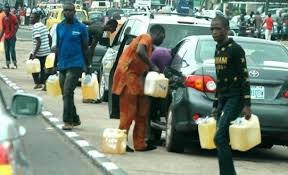At about 9:15 am in the heart of Abuja, a city alive with both promise and peril, the sun hung low along the Gwarinpa-Kubwa expressway, casting long shadows that seemed to reflect the struggles of its inhabitants.
Among them stood Hamid, a 34-year-old fuel hawker, a man whose very existence was a testament to resilience. Clasping a plastic jerrycan, his calloused hands told a story of survival—a dance with danger that he had come to master.
Hamid’s body bore the scars of his chaotic life, each mark a reminder of the hardships he had faced. A displaced individual from an Internally Displaced Persons (IDP) camp, he now navigated the bustling streets of Abuja, selling fuel from jerry cans to support himself and his three surviving siblings. Their fragile existence was built on the precarious foundation of the black market for fuel, a lifeline in a world that seemed to conspire against them.
A single night changed everything. “It felt like a thunderclap,” Hamid recounted, his voice heavy with the weight of loss.
A blaze erupted in their modest apartment, igniting the remnants of unsold fuel. Hamid awoke in a hospital bed, his body battered, his spirit fractured.
The fire claimed not only his livelihood but also his younger brother, Yusuf, leaving him grappling with an overwhelming sense of grief.
Yet, defiance coursed through Hamid’s veins. “Even if I stay at home or hawk fuel, both involve risks,” he told Africa Health Report, (AHR) in Hausa language with his eyes reflecting a steely resolve.
“Hunger will kill us if we stay idle. Returning to Bama, where Boko Haram roams, is a death sentence. Selling fuel may bring danger, but it’s a risk I have to take. After all, we will die one day—it’s better to die doing something than nothing at all.”
The narrative of selling fuel in jerrycans had shifted from remote areas to urban centers like Abuja, driven by the unrelenting scarcity of fuel that gripped the nation. Despite government bans and regulations, the black market thrived, offering a quick fix to those unwilling to endure the long queues and uncertainty at official fuel stations.
An investigation by AHR revealed the intricate web of corruption that enveloped this trade, where desperation often led individuals like Hamid to barter with disaster.
During a visit to a petrol station on Kado Road, our correspondent witnessed the stark contrast of life on the fringes.
Motorists languished in long queues; frustration etched across their faces. Amidst this chaos, black market sellers manoeuvred effortlessly, slipping past barriers to procure fuel with a tip of N500 naira paid to the fuel station attendant.
One black market seller revealed, “I must find a way to survive; the government doesn’t care about us.” His story echoed Hamid’s, both men grappling with the harsh realities of life as refugees in Abuja.
Emeka, a stranded motorist, expressed his frustration: “This filling station has been a nightmare for two days. I watch black marketers come and go while we wait endlessly.” His voice dripped with exasperation, capturing the essence of a city caught in the grip of corruption.
The black market offered a lifeline—albeit an expensive one. Our correspondent who watched from a distance saw some vehicle owners who could not help but buy fuel that cost N10,000 at official stations and was sold for N15,000 in the shadows.
The desperation of the citizens drove them to make compromises, even if it meant accepting the risks associated with dealing with illicit fuels.
A visit to the NNPCL outlets revealed a semblance of order and fairness, with queues moving steadily and fuel being dispensed on a first-come, first-serve basis. However, complaints about the fuel quality persisted, with some motorists opting to avoid official stations altogether due to concerns about fuel efficiency.
A motorist who declined to mention his name in the green-white coloured car said he is a taxi driver and he doesn’t patronise NNPCL stations because their fuel burns faster than other filling stations. ” I don’t know why the fuel finishes so fast, you will buy fuel for N10,000 naira and do only two trips. The tank is empty, so we taxi drivers rarely buy from them but because there is no fuel, I’m here today to keep myself moving.”
Mary, another motorist, recounted her experience with NNPCL stations. “Their fuel burns faster,” she lamented, sharing her frustrations about the quality of the product. “I have to refill more frequently than at other stations, and it’s frustrating to spend so much just to keep moving.”
When our correspondent approached one of the fuel attendants at the NNPCL outlet to ask if motorists had raised similar complaints, the man, with distinct tribal markings on his face, responded with hostility: “I don’t know what you’re talking about. My job is to sell fuel, and that’s it. If anyone doesn’t want to buy, they can leave.”
Amidst the chaos, the allure of survival shone brightly for Hamid and others like him. Their daily struggles painted a vivid picture of resilience against a backdrop of societal decay. “Death is a constant companion,” Hamid reflected. “But I will find a way to keep going.”
To shed light on the underlying causes of the incidents in this hazardous trade, AHR reached out to an electrical engineer, Engr. Sunday Iorliam. “Static electricity can ignite vapours, especially if someone uses a smartphone nearby,” he explained, highlighting the dangers inherent in such a volatile environment.
Speaking further in this interview with AHR, his advice echoed a warning: “Keep electronics away from flammable materials, a lesson learned too late for some.”
In a city where hope flickers like a candle in the wind, Hamid remains undeterred. He continues to hawk fuel, each sale a reminder of his will to survive. The world around him may be chaotic, but within the cracks of despair, there exists a profound story of human spirit and tenacity—a narrative that deserves to be heard, a testament to those who navigate life’s storms with unwavering resolve.
As the sun began to dip below the horizon, casting golden hues across the Gwarinpa-Kubwa expressway, Hamidu stood tall, a figure of resilience amidst the turmoil. In the face of adversity, he had chosen not just to survive, but to live—his journey a poignant reminder that even in the darkest of times, hope can emerge from the most unexpected places.



